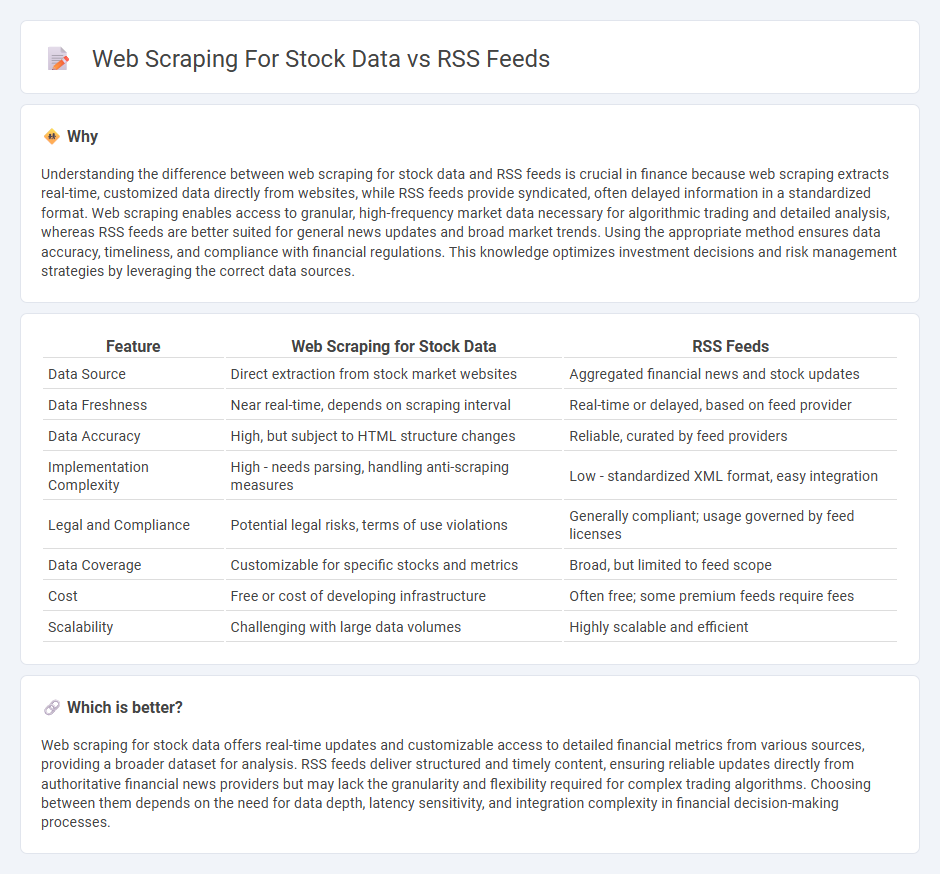
Web scraping for stock data involves extracting real-time and historical financial information directly from websites, ensuring up-to-date and comprehensive market insights. RSS feeds provide a streamlined way to receive curated financial news and stock updates, though often with less granularity and delay compared to direct web scraping. Explore the advantages and limitations of both methods to enhance your market analysis strategy.
Why it is important
Understanding the difference between web scraping for stock data and RSS feeds is crucial in finance because web scraping extracts real-time, customized data directly from websites, while RSS feeds provide syndicated, often delayed information in a standardized format. Web scraping enables access to granular, high-frequency market data necessary for algorithmic trading and detailed analysis, whereas RSS feeds are better suited for general news updates and broad market trends. Using the appropriate method ensures data accuracy, timeliness, and compliance with financial regulations. This knowledge optimizes investment decisions and risk management strategies by leveraging the correct data sources.
Comparison Table
| Feature | Web Scraping for Stock Data | RSS Feeds |
|---|---|---|
| Data Source | Direct extraction from stock market websites | Aggregated financial news and stock updates |
| Data Freshness | Near real-time, depends on scraping interval | Real-time or delayed, based on feed provider |
| Data Accuracy | High, but subject to HTML structure changes | Reliable, curated by feed providers |
| Implementation Complexity | High - needs parsing, handling anti-scraping measures | Low - standardized XML format, easy integration |
| Legal and Compliance | Potential legal risks, terms of use violations | Generally compliant; usage governed by feed licenses |
| Data Coverage | Customizable for specific stocks and metrics | Broad, but limited to feed scope |
| Cost | Free or cost of developing infrastructure | Often free; some premium feeds require fees |
| Scalability | Challenging with large data volumes | Highly scalable and efficient |
Which is better?
Web scraping for stock data offers real-time updates and customizable access to detailed financial metrics from various sources, providing a broader dataset for analysis. RSS feeds deliver structured and timely content, ensuring reliable updates directly from authoritative financial news providers but may lack the granularity and flexibility required for complex trading algorithms. Choosing between them depends on the need for data depth, latency sensitivity, and integration complexity in financial decision-making processes.
Connection
Web scraping for stock data enables the automated extraction of real-time financial metrics, price movements, and market trends from various websites, enhancing investment analysis. RSS feeds distribute up-to-date stock market news, updates, and alerts directly to users, facilitating timely decision-making. Integrating web scraping with RSS feeds creates a comprehensive data aggregation system that improves the accuracy and speed of financial information delivery.
Key Terms
Data Freshness
RSS feeds provide real-time updates from financial news sources, ensuring quick access to the latest stock market information with minimal latency. Web scraping extracts data directly from web pages but may face delays due to server response times and potential changes in website structure. Discover more about optimizing stock data acquisition methods for accuracy and timeliness.
Data Structure
RSS feeds for stock data provide structured XML formats specifically designed for syndication, ensuring standardized tags and consistent metadata that facilitate easy parsing and integration into financial applications. Web scraping retrieves data directly from web pages, often resulting in unstructured or semi-structured HTML content that requires complex parsing logic to extract relevant stock information accurately. Explore deeper insights on optimizing data acquisition methods for financial analytics and decision-making.
Legal Compliance
RSS feeds provide stock data through official channels, ensuring compliance with copyright and data usage policies set by financial information providers. Web scraping, however, often risks violating terms of service or intellectual property rights when extracting stock data without explicit permission. Explore further to understand the legal nuances and best practices for obtaining stock information responsibly.
Source and External Links
How Do RSS Feeds Work? | RSS.com Podcast Hosting - RSS feeds deliver headlines, summaries, and update notices automatically from favorite websites into one real-time, easy-to-read feed, allowing users to stay updated without manually visiting sites or relying on email or social media.
RSS - Wikipedia - RSS (Really Simple Syndication) is a standardized web feed format using XML that enables users to track updates such as blogs, news, and podcasts in one aggregator, removing the need to check sites manually.
How to use RSS feeds to boost your productivity - RSS feeds help consolidate content from blogs, podcasts, and YouTube channels into one place, improving productivity and allowing easy subscription by pasting feed URLs into an RSS reader or creating feeds for sites without them.
 dowidth.com
dowidth.com